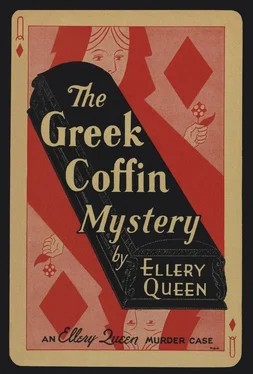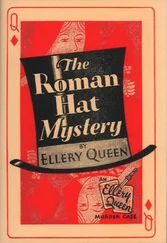Ellery Queen - Greek Coffin Mystery
Здесь есть возможность читать онлайн «Ellery Queen - Greek Coffin Mystery» весь текст электронной книги совершенно бесплатно (целиком полную версию без сокращений). В некоторых случаях можно слушать аудио, скачать через торрент в формате fb2 и присутствует краткое содержание. Город: New York, Год выпуска: 1932, Издательство: Frederick A. Stokes, Жанр: Классический детектив, на английском языке. Описание произведения, (предисловие) а так же отзывы посетителей доступны на портале библиотеки ЛибКат.
- Название:Greek Coffin Mystery
- Автор:
- Издательство:Frederick A. Stokes
- Жанр:
- Год:1932
- Город:New York
- ISBN:нет данных
- Рейтинг книги:3 / 5. Голосов: 1
-
Избранное:Добавить в избранное
- Отзывы:
-
Ваша оценка:
- 60
- 1
- 2
- 3
- 4
- 5
Greek Coffin Mystery: краткое содержание, описание и аннотация
Предлагаем к чтению аннотацию, описание, краткое содержание или предисловие (зависит от того, что написал сам автор книги «Greek Coffin Mystery»). Если вы не нашли необходимую информацию о книге — напишите в комментариях, мы постараемся отыскать её.
When Inspector Queen and his son, Ellery, are brought in to solve the mystery of the missing will, Ellery mentions the one place they have not searched for the will... the coffin! Upon exhumation of the Khalkis coffin they find that it contained not one body — but two!
Greek Coffin Mystery — читать онлайн бесплатно полную книгу (весь текст) целиком
Ниже представлен текст книги, разбитый по страницам. Система сохранения места последней прочитанной страницы, позволяет с удобством читать онлайн бесплатно книгу «Greek Coffin Mystery», без необходимости каждый раз заново искать на чём Вы остановились. Поставьте закладку, и сможете в любой момент перейти на страницу, на которой закончили чтение.
Интервал:
Закладка:
Now Joan Brett, as Ellery Queen was later to appreciate, was a very canny young lady. If she had felt a “tightness in the air,” a tightness in the air there was. But where — from what direction? It was so difficult to pin it to — some one. It might have proceeded from bearded Dr. Wardes, who with Mrs. Vreeland made up the rear of the procession. It might have proceeded from the pall-bearers, or from those who came directly after, with Joan. It might, in point of fact, have proceeded from the house itself, arising from just such a simple matter as Mrs. Simms wailing in her bed, or Weekes the butler rubbing his jaw foolishly in the dead man’s study.
Certainly it does not seem to have thrust barriers in the way of expedition. The cortège made its way, not through the front door to Fifty-fourth Street, but through the back door into the long garden-court serving as a little private lane for the six residences on Fifty-fourth and Fifty-fifth Streets, which enclosed it. They turned to the left and marched through the gate on the west side of the court, and they were in the graveyard. Passersby and curiosity-seekers, attracted like flies to Fifty-fourth Street, probably felt cheated; which was precisely the reason that the private route to the graveyard had been selected. They clung to the spike-topped fence, peering into the little cemetery through the iron bars; there were reporters among them, and cameramen, and every one was curiously silent. The actors in the tragedy paid no attention to their audience. As they wound across the bare sod, another little company faced them, surrounding a rectangular cavity in the grass and a mathematically upturned heap of earth. Two gravediggers — Sturgess’ assistants — were there, and Honeywell, the church sexton; and by herself, a little old lady wearing a preposterously outmoded black bonnet and wiping her bright rheumy eyes. The tightness, if we are to give credence to Joan Brett’s intuition, persisted.
Yet what followed was as innocent as what had gone before. The customary ritualistic preparations; a grave-digger leaning far forward and grasping the handle of a rusty old iron door imbedded horizontally in the earth; a slight rush of dead air; the coffin gently lowered into the old brick-lined crypt beneath; a milling of workmen, some low hurried words, the shifting of the coffin slowly to one side out of sight, where it nudged its way into one of the many niches of the underground vault; the iron door clanging to, the earth and sod replaced above it... And somehow, Joan Brett was positive when she later told of her impressions of that moment, somehow the tightness in the air vanished.
2 ... Hunt
Vanished, that is to say, until a brief few moments after the funeral party, retracing its route through the garden-court, returned to the house.
Then it materialized again, accompanied by such a horde of ghastly events as made its source very clear indeed much later.
The first warning of what was to come was sounded by Miles Woodruff, the dead man’s attorney. The picture seems to be etching-sharp at this point. The Reverend Elder had returned to the Khalkis house to offer consolation, trailing in his wake the dapper, clerical and annoyingly fidgety figure of Sexton Honeywell. The little old lady with the bright rheumy eyes who had met the cortège in the graveyard had expectantly joined the returning procession and was now in the drawing-room, inspecting the barren bier with a hypercritical air, while Undertaker Sturgess and his assistants busied themselves removing the grisly signs of their labor. No one had asked the little old lady in; no one now took cognizance of her presence except perhaps imbecile Demmy, who was eying her with a faintly intelligent dislike. The others had taken chairs, or were wandering listlessly about; there was little conversation; no one except the undertaker and his assistants seemed to know what to do.
Miles Woodruff, as restless as the others, seeking to bridge the ugly post-burial gap, had sauntered into the dead man’s library quite without purpose, as he said later. Weekes, the butler, clambered to his feet in some confusion; he had been nodding a bit, it appears. Woodruff waved his hand and, still aimlessly, occupied with dismal thoughts, strolled across the room to the stretch of wall between two bookcases where Khalkis’ wall-safe was imbedded. Woodruff has stoutly maintained that his act in twirling the dial of the safe and selecting the combination which caused the heavy round little door to swing open was wholly mechanical. Certainly, he averred later, he had not intended to look for it, let alone find it missing. Why, he had seen it, actually handled it only five minutes before the funeral party left the house! However, the fact remains that Woodruff did discover, whether by accident or design, that it was gone, and the steel box too — a discovery which sounded the warning-note that, quite like The House That Jack Built, caused the tightness to reappear that led to all the dire events that followed.
Woodruff’s reaction to its disappearance was characteristic. He whirled on Weekes, who must have thought the man had gone insane, and shouted, “Did you touch this safe?” in a terrible voice. Weekes stammered a denial and Woodruff puffed and blew. He was hot on a chase, the goal of which he could not even vaguely see.
“How long have you been sitting here?”
“Ever since the funeral party left the house to go to the graveyard, sir.”
“Did any one come into this room while you were sitting here?”
“Not a living soul, sir.” Weekes was frightened now; the ring of cotton-white hair at the back of his pink scalp, puffing over his ears, quivered with earnestness. In the eyes of stuffy old Weekes there was something terrifying in Woodruff’s lord-and-master pose. Woodruff, it is to be feared, took advantage of his bulk, his red face and crackling voice to browbeat the old man almost to tears. “You were asleep!” he thundered. “You were dozing when I walked in here!”
Weekes mumbled in a soupy voice, “Just nodding, sir, really, sir, just nodding, sir. I wasn’t asleep for an instant. I heard you the instant you came in, didn’t I, sir?”
“Well...” Woodruff was mollified. “I guess you did as that. Ask Mr. Sloane and Mr. Cheney to come in here at once.”
Woodruff was standing before the safe in a Messianic attitude when the two men came in, looking puzzled. He challenged them silently, with his best witness-baiting manner. He noticed at once that something was wrong with Sloane; precisely what he could not make out. As for Alan, the boy was scowling as usual, and when he moved nearer to Woodruff the lawyer caught the pungent odor of whisky on his breath. Woodruff spared no language in his peroration. He chopped at them savagely, pointed to the open safe, eyed each of them with heavy suspicion. Sloane shook his leonine head; he was a powerful man in the prime of life, elegantly attired in the height of foppish fashion. Alan said nothing — shrugged his spare shoulders indifferently.
“All right,” said Woodruff. “It’s all right with me. But I’m going to get to the bottom of this, gentlemen. Right now.”
Woodruff appears to have been in his glory. He had every one in the house peremptorily summoned to the study. Amazing as it may seem, it is true that within four minutes of the time the funeral party returned to the Khalkis house, Woodruff had them all on the carpet — all, including even Undertaker Sturgess and his assistants! — and had the dubious satisfaction of hearing them, to the last man and woman, deny having taken anything out of the safe, or even having gone to the safe that day at all.
It was at this dramatic and slightly ludicrous moment that Joan Brett and Alan Cheney were struck by the same thought. Both plunged for the doorway, colliding, boiling out of the room into the hall, flying down the hall to the foyer. Woodruff, with a hoarse shout, lunged after them, suspecting he knew not what. Alan and Joan assisted each other in unlocking the foyer door, scrambled through the vestibule to the unlocked street-door, flung it open and faced a mildly astonished throng in the street, Woodruff hurrying after them. Joan called out in her clear contralto, “Has any one come into this house in the past half-hour?” Alan shouted, “Anybody?” and Woodruff found himself echoing the word. A hardy young man, one of a group of reporters draped over the latched gate on the sidewalk, distinctly said, “No!”, another reporter drawled, “What’s up, Doc? Why the hell don’t you let us inside? — we won’t touch nothin’,” and there was a little scattering of applause from the onlookers in the street. Joan blushed, as was natural, and her hand strayed to her auburn hair, patting it for no apparent reason into place. Alan cried, “Did anybody come out?” and there was a thunderous chorus of “No!” Woodruff coughed, his self-assurance shaken by this public spectacle, irritably herded the young couple back into the house, and carefully locked the doors behind him — both of them, this time.
Читать дальшеИнтервал:
Закладка:
Похожие книги на «Greek Coffin Mystery»
Представляем Вашему вниманию похожие книги на «Greek Coffin Mystery» списком для выбора. Мы отобрали схожую по названию и смыслу литературу в надежде предоставить читателям больше вариантов отыскать новые, интересные, ещё непрочитанные произведения.
Обсуждение, отзывы о книге «Greek Coffin Mystery» и просто собственные мнения читателей. Оставьте ваши комментарии, напишите, что Вы думаете о произведении, его смысле или главных героях. Укажите что конкретно понравилось, а что нет, и почему Вы так считаете.












